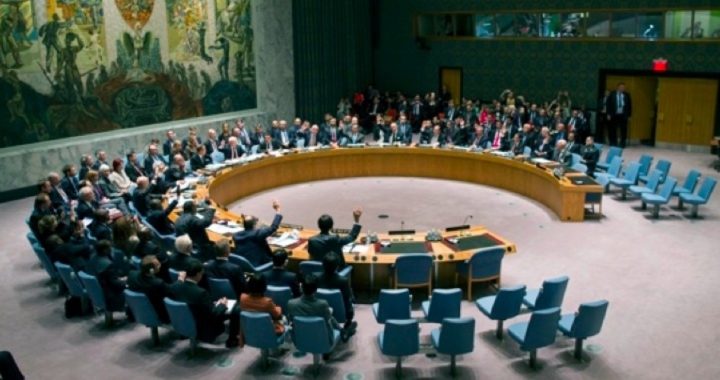
When the United Nations Security Council agreed to enforce a chemical arms ban in Syria, it was a significant step toward establishing the UN as a global police force. “Tonight, the international community has delivered,” UN Secretary-General Ban Ki-moon said after the September 27 agreement was concluded. “I welcome the commitment to safeguard and destroy Syria’s chemical weapons stockpiles.”
The Syria agreement followed up on Ki-moon’s September 24 address opening the UN General Assembly. “I urge you to embrace the global logic of our times,” Ki-moon said. “With our fates ever more entwined, our future must be one of ever deeper cooperation. In this transformed global landscape, let us find new ways of governing, partnering and problem-solving. Let us empower the United Nations to be more than a first responder or a last resort.”
The idea that the United Nations would increasingly engage in “governing” and become “more than a first responder” was also promoted by top Obama administration officials. “The United Nations Security Council has demonstrated that diplomacy can be so powerful it can peacefully defuse the worst weapons of war,” U.S. Secretary of State John Kerry said after the vote. Kerry continued:
But tonight’s resolution, in fact, accomplishes even more. Through peaceful means, it will, for the first time, seek to eliminate entirely a nation’s chemical weapons capability, and in this case specifically Syria’s. On-site inspections of the places that these weapons are stored will begin by November, and under the terms of this agreement, those weapons will be removed and destroyed by the middle of next year…. For the first time since Syria’s civil war began, the Security Council is spelling out in detail what Syria must do to comply with its legal obligations. Syria cannot select or reject the inspectors. Syria must give those inspectors unfettered access to any and all sites and to any and all people….
We are here united tonight in support of our belief that international institutions do matter, that international norms matter. We say with one voice that atrocities carried out with the world’s most heinous weapons will not be tolerated. And when institutions like the Security Council stand up to defend the principles and values that we all share, when we put violent regimes on notice that the world will unite against them, it will lead not only to a safer Syria, but it will lead to a safer world.
Of course, that may mean U.S. military intervention in Syria, despite the strong public backlash against Obama’s stated intention to deploy troops announced back on August 31.
Longtime critics of the United Nations and U.S. foreign entanglements such as The John Birch Society have noted that the UN resolution means U.S. military involvement in Syria, either up front or behind the scenes. “Who’s going to do that?” John Birch Society CEO Art Thompson told The New American. “The United Nations is not going to go in there. The people who are working for the United Nations are going to go in there. Some part of our military is going to go in there to enforce the mandate. The United Nations doesn’t have a military.”
Thompson noted that interventions of this kind have tended to exacerbate human rights tragedies, as happened during the Rwandan genocide. “The problem is that everywhere we go abroad,” Thompson said, “we are messing it up. We’re doing the opposite of what we profess to go in there for, which is to set up ‘democracy.’” In Rwanda, UN disarmament officials disarmed what ended up being the victims of the 1994 genocide.
The John Birch Society has long been a critic of both the United Nations, U.S. involvement in it, and historical efforts to empower the UN by U.S. State Department officials.
Photo of UN Security Council: AP Images



